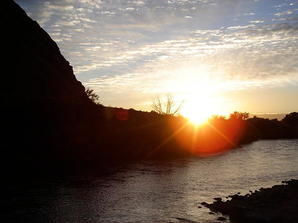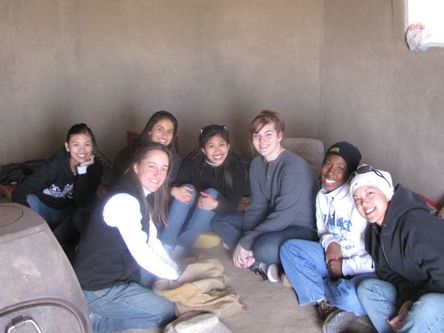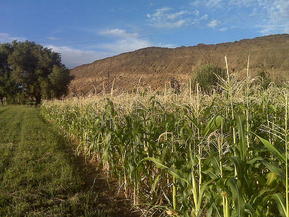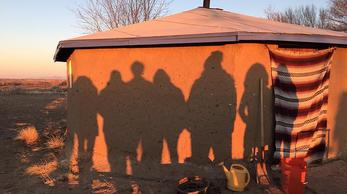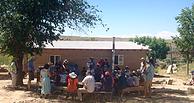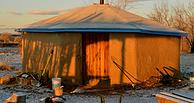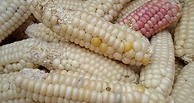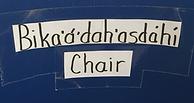What does it mean to be a good human being?
How do we live in harmony, balance, and beauty?
Tsedaak’aan Learning Community (TDK) emerged organically over time in response to the questions above. Most people say you just can't describe TDK, so we won't try. Quiet, humble and off the radar, TDK was a community-driven, community-based learning space that evolved without a "plan" (and we actually prefer it this way) based a caring web of friends, relatives, and neighbors working together to support the restoration of relationship...with ourselves, with each other and with the Earth. TDK learning community grew organically over the years out of the simple effort of simple folks to explore what it means to be a good human being and to restore hozhoin, which translates into "a sense of being and living as humans in harmony, balance, and beauty."
Home to numerous meetings, gatherings, and community projects, TDK served both visiting and local students and groups who worked together to build an adobe multi-purpose Sunhouse and a shadehouse, as well as an outhouse. TDK also included key features to support irrigation and organic farming. TDK evolved around the need to revive traditions and implement techniques for natural living that could serve as a model for others to experience and learn from including swales, companion planting, traditional foods and medicines, a rocket stove, beehives, and a compost toilet and following natural cycles of learning by relating to seasons, earth, sky, sunrise, and sunset. TDK was designed to promote a safe space from which to learn, think, be, feel, grow, and know.
Our efforts have been experiential, wholistic, natural, restorative, and relational, offering opportunities for non-modern being, learning, and knowing. Committed to nurturing kinship and community, and we are a place where learning never ends ... where life and learning are a participatory, 24/7 process, that Is likened to what a “traditional Indigenous multi-versity” might look and feel like .
Home to numerous meetings, gatherings, and community projects, TDK served both visiting and local students and groups who worked together to build an adobe multi-purpose Sunhouse and a shadehouse, as well as an outhouse. TDK also included key features to support irrigation and organic farming. TDK evolved around the need to revive traditions and implement techniques for natural living that could serve as a model for others to experience and learn from including swales, companion planting, traditional foods and medicines, a rocket stove, beehives, and a compost toilet and following natural cycles of learning by relating to seasons, earth, sky, sunrise, and sunset. TDK was designed to promote a safe space from which to learn, think, be, feel, grow, and know.
Our efforts have been experiential, wholistic, natural, restorative, and relational, offering opportunities for non-modern being, learning, and knowing. Committed to nurturing kinship and community, and we are a place where learning never ends ... where life and learning are a participatory, 24/7 process, that Is likened to what a “traditional Indigenous multi-versity” might look and feel like .
TDK Learning Community was developed in partnership
between two educators committed to real-life, community-based learning
and rooted in indigenous ways of knowing, being, and learning,
Dr. Larry Emerson and Jennifer Nevarez.
The video below is a montage created years ago for TDK students and visitors.
Where?Tsedaak’aan is a community on the Diné Nation. The Diné Nation is a sovereign nation and has its own political jurisdiction and laws, language, history, and culture. The Diné Nation is situated within what the Diné call the Four Sacred Mountains or Dinétah. These mountains are Sisnaajinii (referred to in English as Mount Blanca near Alamosa, Colorado), Tsoodzil (referred to in English as Mount Taylor near Grants, New Mexico) Dook’o’oosl77 (referred to in English as San Francisco Peaks near Flagstaff, Arizona), and Dzi[ Dib'nitsaa (referred to in English as Hesperus Mountain near Durango, Colorado).
Tsedaak’aan is about 5000 ft above sea level. The land is a high desert plateau situated at the base of the southwestern Colorado Rocky Mountains (Cortez and Durango). Tsedaak’aan is the name of a monocline sandstone formation just north of Highway 64. The farming community around the monocline is called Tsedaak’aan east of Shiprock and west of Farmington, New Mexico. The community is located in what is referred to in English as the “Four Corners” area of the United States. |
|
|
Restoration
of Kinship A Ke'-based, safe, and nurturing place for community gatherings and meetings. Diné Peacekeepers, Women in Circle, Men's Healing Circles, Youth Activitsts, The Walkers, Teacher's Forum, Traditional Weavers, Artisans, and Singers, Northern youth Council, Indigenous Researchers, etc |
Intergenerational Learning
An indigenous hoghan-centered process for teaching and learning.
Following natural protocols of living and being in what we could describe as an" indigenous multi-versity" learning model. |
Language
Revitalization A community-engaging opportunity to restore language and culture through real-life learning in real-life places linking youth with fluent elders, adults, and community wisdom-keepers. Passing on the Diné language and culture to future generations through community-based learning. |
Decolonization
& Resiliency A land-based, hands-on learning opportunity for exploring de-colonization and sharing models of resiliency. Models include: natural water catchment, companion planting, traditional foods and herbal medicines, building with earth, compost toilets, rocket stoves, seed-saving, bee-keeping, composting, and more. |

